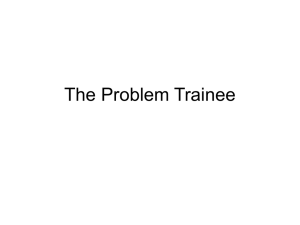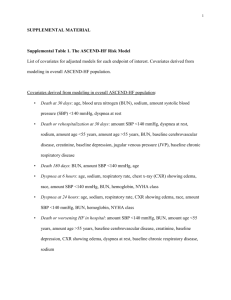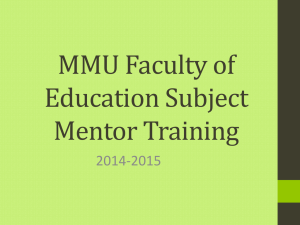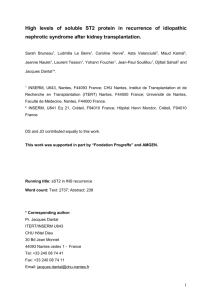SSRP Research Summary (Anna Adlam)
advertisement

Small-scale Service-related Research Projects Anna Adlam a.r.adlam@exeter.ac.uk September 2014 Aims and Objectives • Research module updates • Describe the purpose of small scale research projects (SSRP) • Discuss the roles of the trainee, research tutor, and clinical supervisor/service commissioner • Differentiate between audit, service evaluation, and research • Different ways to disseminate study findings • Obtain your feedback Research Module Updates DClinPsy Research Team 2013/14 Professor Ed Watkins (0.2) Director of Professional Doctorate Research/ DClinPsy Research supervisor Dr Janet Smithson (0.3) Qualitative teaching lead Research supervisor Dr Anna Adlam (0.6) Deputy Director of Professional Doctorate Research/DClinPsy Research supervisor Dr Nick Moberly (0.6) Quantitative teaching lead Research tutor Year 2 research lead Research supervisor Dr Anke Karl (0.4) Research tutor Year 1,3 research lead/SSRP lead Research supervisor Dr Phil Yates (0.1) Research supervisor Professor Huw Williams (0.2) Research tutor Research supervisor Emma Woodcock Administrator DClinPsy Research Team Interests Professor Ed Watkins CBT & depression, cognitive bias modification, mental habits in depression –worry, rumination, transdiagnostic approach Dr Janet Smithson Qualitative research & family function & health Dr Anna Adlam Executive processes in memory; executive processes in mood disorders & interventions (children/dementia) Dr Nick Moberly Motivation, goal processing, & rumination in depression Dr Phil Yates Brain injury & health Dr Anke Karl PTSD & postnatal depression Professor Huw Williams Mild traumatic brain injury, crime & socioemotion processing DClinPsy Research Team Roles • Director of Professional Doctorate Research (Ed) & Deputy Director (Anna) – Oversees research strategy of the programme – Represents research module at Programme (SMG), College, and Faculty level – Short-listing & selection; allocates research supervisors; manages research team; • Research tutors (Nick, Anke, Huw) – Year 1: 3 x research tutorials – Co-supervisor for SSRP during Year 1 & 2 (Janet Smithson for consultation on qualitative projects) – Weekly research consultations Years 1, 2, & 3 (Anke & Nick) • Research supervisors (all research team via Research Fair in Year 1) – Thesis supervision: March of Year 1 through to end of training – Monthly supervision, review write-up – Tracking of research progress via MyPGR and regular progress reports at research tutor meetings and SMG DClinPsy Research Aims • Scientist-practitioner model • Part of the leadership role of clinical psychology • Prepare graduates for a changing clinical world – Understand and contribute to the clinical research literature – Conduct sound, high-quality research with a firm grounding in the best research methodology at a PGR level – Be able to effectively utilise clinical research in day-to-day clinical practice and to respond fluidly and knowledgeably to changing clinical demands (BPS Core Competency, HCPC Standard of Proficiency) – Draw on and contribute to the research base to shape clinical programmes and service delivery, and guide practice DClinPsy Research Context Research teaching delivered in Year 1 is based on the Medical Research Council’s Complex Interventions Framework SSRP Definition & Aims SSRP Definition & Aims • Small-scale clinically relevant research informed by psychological theory/models • Aims – To provide trainees with experience of completing high quality service-related research within a clinical/healthcare context – To foster the development of research awareness and skills – To increase awareness of theory-practice links BPS Core Competencies • 3.6 Research (BPS, 2006) – Identifying and critically appraising research evidence relevant to practice – Conducting service evaluation and small N research – Conducting collaborative research – Planning and conducting independent research, i.e. identifying research questions, demonstrating an understanding of ethical issues, choosing appropriate research methods and analysis, reporting outcomes and identifying appropriate pathways for dissemination. BPS Accreditation • “Trainees must complete at least one formally assessed small-scale project involving the use of audit, service development, service evaluation or applied research methods within a clinical placement setting.” (BPS Accreditation criteria, 2011) HCPC standards • Clinical psychologists are expected to be able to conduct service related research SSRP Designs • Either service evaluation or service audit (will come back to these definitions) • No set rules on design! – – – – – – Quantitative or qualitative Group design or case series Test for differences or associations (correlation) Retrospective (anonymised) data or new data Data collected by service or data collected by trainee Independent projects or joint/collaborative projects with other trainees – Service evaluation within a research framework – Service audit/evaluation working alongside commissioners (demonstrating the added value of trainee clinical psychologists to commissioners; engaging trainees in leadership & clinical commissioning issues) SSRP Process SSRP process • Study should be conducted in the trainee’s locality • Timetabled teaching sessions on research methods and design in Year 1 • Previous SSRP titles and abstracts are available to trainees • Research PBL assignment Year 1 involves critically evaluating and designing a SSRP • SSRP to be submitted in Year 2 (June 2016), and Thesis submitted Year 3 (May 2017) – timelines will overlap • However, trainee has study time throughout all three years including Years 1 and 2 Proposed Timelines for SSRP Year 1 Aug-Sep 2014 Nov-Dec 2014 Jan-Feb 2015 Feb–Dec 2015 Research team to contact potential SSRP providers and develop project proposal; (internal review & feedback); trainee is allocated project based on locality Trainee meets with SSRP supervisor and research tutor. Trainee submits SSRP to University ethics/R&D Trainee starts SSRP with ethical approval Design measures/data collection/data collation June 2015 – October 2015 focus on thesis project proposal Year 2 Jan-March 2016 April-May 2016 June 2016 Data analysis Write report Submit report Dissemination Jan 2016 – April 2016 apply for ethics for thesis project proposal May 2016 – start data collection for thesis project Roles & Responsibilities SSRP Roles and Responsibilities • Trainee – Arrange to meet with SSRP supervisor/research tutor (November/December 2014) to discuss project – Conduct literature search relevant to project proposal – Submit project proposal to University ethics (January/February 2015) – Obtain R&D approval for service-based studies – Arrange regular SSRP supervision with clinical supervisor – Arrange to meet with research tutors during research consultancy – Recruit/collect/collate data – Data analysis – SSRP report write up – Dissemination to the service and wider academic/clinical community SSRP Roles and Responsibilities • Local clinical supervisors/commissioners – Propose SSRP project ideas to research tutors and develop these with the allocated research tutor – Provide regular SSRP supervision as arranged with trainee – Promote SSRP within the service and facilitate recruitment/data collation – Facilitate dissemination of study findings to service, and academic/clinical community SSRP Roles and Responsibilities • Research tutors – Facilitate the development of SSRP study idea in collaboration with clinical supervisors/commissioners – Provide guidance on UoE criteria for SSRPs – Provide consultation/guidance on study design, project proposal for ethics submission – Provide regular research consultations throughout Year 1 & 2 SSRP Report • 4,000 word report to be submitted June 2016 (Year 2) – Abstract – Introduction to background psychological theory/literature and clinical implications – Rationale, study aims/hypotheses – Methods including sample, procedure, ethical considerations – Study results – Discussion of study findings in the context of the specific problem being addressed – Recommendations for future research – Clinical practice implications and service provision – Presentation - APA 6 formatting – Appendices must include evidence of ethics and R&D approval, evidence of dissemination process (or plans), summary of trainee’s contribution to research if part of a collaborative project. Defining service evaluation, audit, and research See NRES (2010) Defining research leaflet Dissemination Why is dissemination important? Context of Dissemination • Marked assignments – SSRP report • Service related – Multi-disciplinary team – Service users • Academic – Conferences – Peer-reviewed journal articles • Clinical – Clinically relevant publications – Special interest groups – Policy making, service development, service stakeholders Forms of Dissemination • • • • • • • • Written reports Summary letters Oral presentations Posters Magazine articles Peer-reviewed journal articles Websites Video films, media (radio)
